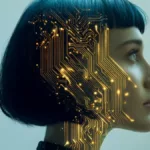There’s been a lot of discussion in 2017 about artificial intelligence, or AI, and the impact its having on different industries. Artificial intelligence lends itself to fields with abundant data where narrowly focused algorithms can be applied. The same technology in self-driving cars is making waves in the field of health care.
The health industry is already using AI in amazing ways, and the first medical AI systems have already been changing the face of health. At the Mayo Clinic researchers have used AI to identify and diagnose brain tumours, without having to perform a biopsy. What they discovered shows that deep machine learning was able to uncover features that MRI scans were unable to detect.
At Stanford University, researchers are training AI to recognize skin cancer lesions with the same level of accuracy an expert dermatologist, the same technology is also being used to detect lesions in the liver too. IBM’s Watson project helps doctors design patient treatment plans, Google’s Deepmind Health mines medical records for data to help provide faster services, and a Professor at Harvard University just designed an A.I. system that invents new drug compounds. It’s even being used to try and tackle mental health issues, like depression and suicide.
Health care is currently plagued by a massive skills shortage. According to the World Health Organisation, we’re currently short over seven million physicians, nurses and health workers, this number is expected to reach over 13 million by 2035. But artificial intelligence systems like may provide the solution. Machines learning systems like these are incredibly cheap to run. Costing a fraction of a cent per diagnosis. And there are added benefits too. These systems have no waiting lists, the machines will never get tired or sick or skip work, and they can be accessed anywhere in the world as long as there is an internet connection. Medical artificial intelligence is set to make healthcare more accessible and affordable for everyone.
According to the experts, artificial intelligence and machine learning in healthcare will only get better and provide benefits to prevention and diagnosis, analyse and interpret the results of clinical trials, and even develop customised drugs based on an individual’s unique DNA and inform treatment.
Sophisticated algorithms will be able to search through thousands of surgeries and help doctors predict risks and recovery time, intuitive apps will make treatment and diagnosis easier by interpreting laboratory results. Wearable devices will be able to provide live information about patient care to doctors 24/7, offering earlier detection, better diagnosis, and improved outcomes. Every procedure, from a kidney transplant to a revision facelift will be enhanced by some form of AI.
If you haven’t already interacted with Medical AI, you soon will. Some of it will be in your hands at the touch of the button, but most of it will be invisible. Working behind the scenes to make healthcare cheaper and more effective. There’s isn’t an aspect of healthcare that AI solutions won’t touch over the course of the next decade.








